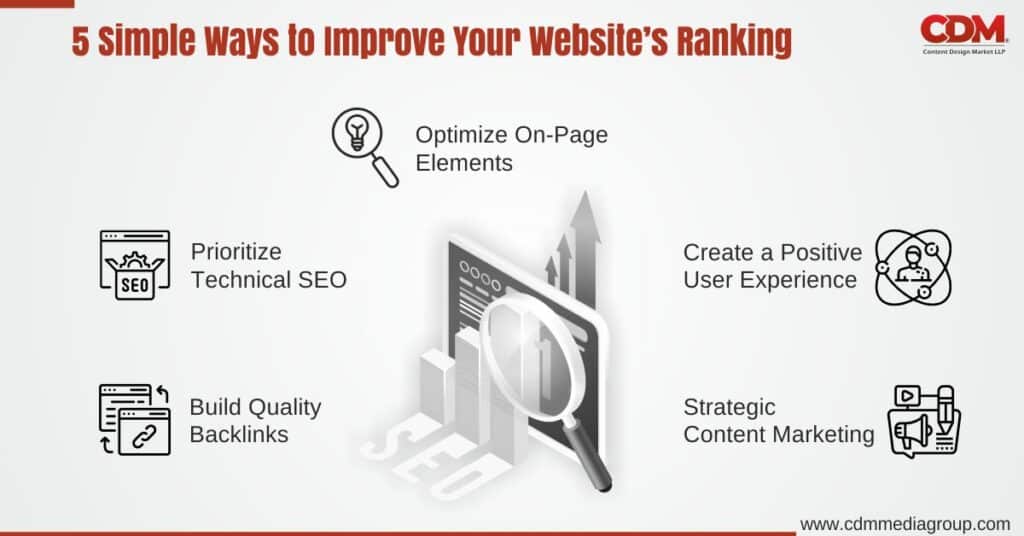Achieving a high search engine ranking is a must for visibility and success in the competitive online space, where millions of websites compete for attention. Search engine optimization (SEO) is crucial, whether you’re promoting your brand, managing a blog, or operating a business.
In this blog post, we’ll explore five proven ways to improve your website’s ranking and strengthen its online presence.

Optimize On-Page Elements
A well-performing website establishes itself through on-page SEO. This involves focusing on specific elements of your web pages to make them search engine-friendly.
- Keyword Research and Integration: Perform in-depth keyword research to find the terms and phrases that your target audience is going to use in their search queries. Integrate these keywords strategically into your content, including titles, headings, meta descriptions, and body text. However, ensure that keyword usage feels natural and aligns with the context of your content.
- High-Quality Content: Craft informative, engaging, and relevant content that addresses the needs of your audience. Search engines prioritize content that provides value to users. Regularly update your content to keep it fresh and aligned with current trends in your industry.
- User-Friendly URLs and Navigation: Ensure your website’s URLs are clear, concise, and user-friendly. Use descriptive keywords in URLs to enhance both the user experience (UX) and search engine visibility. Additionally, create a logical and intuitive website structure. Easy navigation not only assists users but also helps search engines understand the structure of your content.
- Optimize Images and Multimedia: A key component for improving the UX is the use of multimedia and images. However, they need to be optimized for search engines. Compress images to reduce loading times, use descriptive alt text, and include relevant keywords where appropriate. This not only improves accessibility but also contributes to better search engine rankings.
Prioritize Technical SEO
Technical SEO focuses on the internal processes of your website, making sure it is both technically robust and easy for search engines to access.
- Mobile Optimization: With a significant portion of internet users accessing content through mobile devices, optimizing your website for mobile is essential. Responsive design ensures your site adapts seamlessly to various screen sizes, providing an optimal viewing experience and boosting your mobile search rankings.
- Page Loading Speed: Users and search engines prefer fast-loading websites. Optimize your site’s performance by compressing images, leveraging browser caching, and minimizing unnecessary code. Tools such as Google PageSpeed Insights can help identify areas for improvement, enhancing both the UX and search engine rankings.
- Secure Website with HTTPS: Security is a ranking factor for search engines. Transitioning to HTTPS by installing an SSL certificate not only secures data transmission but also signals to search engines that your website is trustworthy. This small yet impactful change can positively influence your search rankings.
- Fixing Crawl Errors: Regularly check for crawl errors using tools such as Google Search Console. Address issues such as broken links, missing pages, or server errors promptly. A clean and error-free website is more inclined to be indexed and ranked favorably by search engines.
Build Quality Backlinks

Inbound links, often known as backlinks, are an effective indicator of the authority and relevancy of your website. However, not all backlinks are created equal; quality and relevance matter.
- Natural Link-Building: Focus on creating high-quality, shareable content that naturally attracts links. This could be in the form of blog posts, infographics, case studies, or industry reports. When other reputable websites link to your content, it strengthens your site’s authority in the eyes of search engines.
- Guest Posting: Contribute guest posts to reputable websites in your industry. This not only exposes your content to a broader audience, but also allows you to include a link back to your website. However, prioritize quality over quantity, as search engines are vigilant against spammy link-building practices.
- Internal Linking: Strategically link to relevant internal pages within your website. Internal linking helps distribute authority across different pages and improves the overall structure of your site. It also boosts engagement by encouraging users to explore further into your content.
- Monitor and Eliminate Low-Quality Backlinks: Regularly audit your backlink profile using tools such as Google Search Console or third-party applications. Identify and eliminate low-quality or spammy backlinks to prevent them from negatively impacting your website’s credibility and ranking.
Create a Positive UX
UX determines how search engines look at your website, in addition to being crucial for retaining visitors.
- Intuitive Website Design: Ensure your website design is intuitive and visually appealing. A clean, well-organized layout contributes to a positive UX. Use clear call-to-actions (CTAs) to guide visitors towards desired actions, whether it’s making a purchase, filling out a form, or engaging with content.
- Readable and Accessible Content: Make your content easily readable by using legible fonts, appropriate font sizes, and ample white space. Ensure accessibility by providing alternative text for images, using descriptive headers, and creating content that is easily understandable to a diverse audience.
- Decrease Bounce Rate: A high bounce rate (the percentage of visitors who leave after viewing only one page) can negatively impact your website’s ranking. Keep visitors engaged by offering relevant content, improving page loading speed, and creating a seamless browsing experience.
- Social Proof and Trust Signals: Include social proof, such as customer testimonials, reviews, or case studies, to build trust with your audience. Trust signals contribute to a positive UX and can indirectly influence website’s ranking.
Strategic Content Marketing
An essential component of SEO is content marketing, which not only signals relevance to search engines but also provides valuable information to users.
- Content Quality and Relevance: Prioritize creating high-quality, relevant content that addresses the needs and interests of your target audience. Regularly update your content to stay current and competitive in your industry. Content that adds value and answers user queries tends to be rewarded with higher search rankings.
- Long-Form Content: While not applicable to every piece of content, long-form articles or comprehensive guides often perform well in search results. They provide an opportunity to cover topics in depth, showcase expertise, and signal authority to search engines.
- Utilize Keywords Naturally: Integrate keywords naturally into your content. Avoid keyword stuffing, as this can lead to penalization by search engines. Focus on providing valuable information that naturally incorporates relevant keywords when needed.
- Diversify Content Types: Modify the various types of content you offer to cater to a broad spectrum of interests. To reach larger audiences, use interactive content, podcasts, infographics, videos, and blog posts. This improves user interaction while also giving search engines an indication of adaptability.
Improving your website’s rating is a complex task that calls for a systematic and holistic strategy. By optimizing on-page elements, prioritizing technical SEO, building quality backlinks, creating a positive UX, and implementing strategic content marketing, you can strengthen your website’s visibility and enhance its position in search engine rankings. Consistency, adaptability, and a commitment to providing value to your audience are key principles for achieving and maintaining a competitive edge in today’s digital marketplace.
Skyrocket Your Website’s Ranking with CDM!
With our content-first strategy, experience growth that has never been seen before. Having an experience of serving clients globally, CDM’s specialized marketing techniques can help boost your online visibility, increase revenue, and captivate your audience!
Explore Our Content Marketing Services Here!




